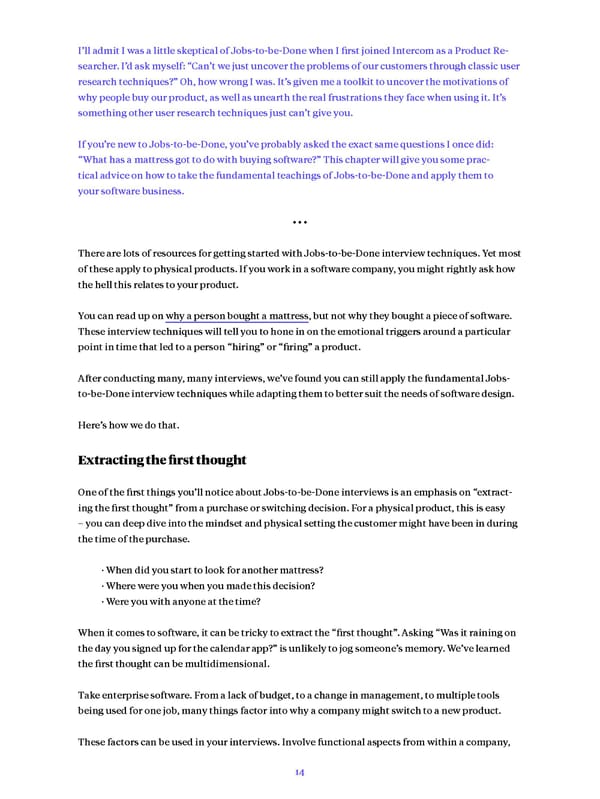I’ll admit I was a little skeptical of Jobs-to-be-Done when I first joined Intercom as a Product Re- searcher. I’d ask myself: “Can’t we just uncover the problems of our customers through classic user research techniques?” Oh, how wrong I was. It’s given me a toolkit to uncover the motivations of why people buy our product, as well as unearth the real frustrations they face when using it. It’s something other user research techniques just can’t give you. If you’re new to Jobs-to-be-Done, you’ve probably asked the exact same questions I once did: “What has a mattress got to do with buying software?” This chapter will give you some prac- tical advice on how to take the fundamental teachings of Jobs-to-be-Done and apply them to your software business. • • • There are lots of resources for getting started with Jobs-to-be-Done interview techniques. Yet most of these apply to physical products. If you work in a software company, you might rightly ask how the hell this relates to your product. You can read up on why a person bought a mattress, but not why they bought a piece of software. These interview techniques will tell you to hone in on the emotional triggers around a particular point in time that led to a person “hiring” or “firing” a product. After conducting many, many interviews, we’ve found you can still apply the fundamental Jobs- to-be-Done interview techniques while adapting them to better suit the needs of software design. Here’s how we do that. Extracting the first thought One of the first things you’ll notice about Jobs-to-be-Done interviews is an emphasis on “extract- ing the first thought” from a purchase or switching decision. For a physical product, this is easy – you can deep dive into the mindset and physical setting the customer might have been in during the time of the purchase. · When did you start to look for another mattress? · Where were you when you made this decision? · Were you with anyone at the time? When it comes to software, it can be tricky to extract the “first thought”. Asking “Was it raining on the day you signed up for the calendar app?” is unlikely to jog someone’s memory. We’ve learned the first thought can be multidimensional. Take enterprise software. From a lack of budget, to a change in management, to multiple tools being used for one job, many things factor into why a company might switch to a new product. These factors can be used in your interviews. Involve functional aspects from within a company, 14
 Intercom on Jobs-to-be-Done Page 14 Page 16
Intercom on Jobs-to-be-Done Page 14 Page 16